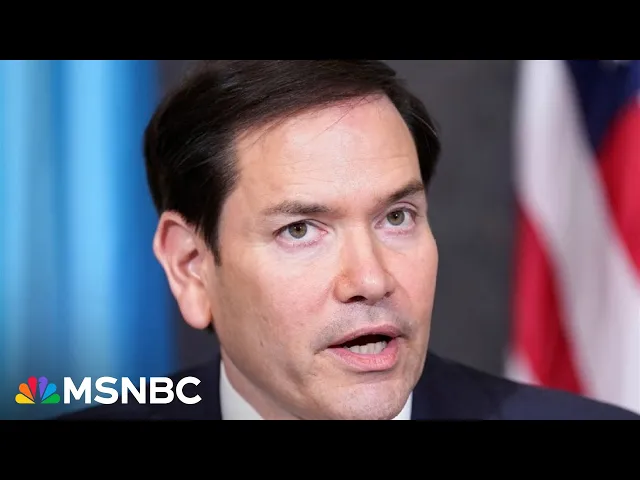‘Get your act together!’: Michael Steele to Congress after AI Rubio deepfake hits foreign officials

Deepfakes upend politics: Congress must respond
In an era where digital deception blurs the lines between fact and fiction, AI-generated deepfakes have emerged as a formidable threat to political discourse and international relations. The recent incident involving a deepfake of Senator Marco Rubio reaching foreign officials has set off alarm bells across Washington and beyond, highlighting just how unprepared our institutions are for this rapidly evolving technology.
Key Points
-
A sophisticated AI-generated deepfake of Senator Marco Rubio recently reached foreign officials, demonstrating how these technologies now pose real national security threats rather than merely theoretical concerns.
-
Former RNC Chairman Michael Steele delivered a forceful call to action, demanding Congress "get your act together" and implement comprehensive legislation to address deepfakes before they further undermine democratic processes.
-
The current regulatory landscape around AI-generated content remains fragmented and insufficient, with proposed legislation stalled despite growing bipartisan recognition of the threat.
When Fiction Becomes Dangerous Reality
The most troubling aspect of the Rubio deepfake incident isn't just that it happened, but that it successfully reached foreign officials who potentially could have acted on the misinformation. This crosses a critical threshold from deepfakes as novelties or election-season nuisances to genuine national security concerns. As Michael Steele emphasized in his impassioned commentary, these technologies have moved beyond hypothetical dangers to present clear and immediate threats to democratic institutions and international stability.
This development represents a watershed moment in the deepfake timeline. Previously, most concerns focused on election interference or personal reputation damage. Now, we're witnessing how these technologies can disrupt diplomatic channels and potentially trigger international incidents. The technology has outpaced our regulatory frameworks and institutional safeguards, creating a dangerous vulnerability in our information ecosystem.
The situation reflects a broader trend in how emerging technologies are reshaping the information landscape faster than governance structures can adapt. Similar patterns emerged with social media's impact on elections, privacy concerns around data collection, and misinformation campaigns – but deepfakes represent a particularly insidious evolution because they undermine the fundamental ability to trust what we see and hear.
Beyond the Video: What Wasn't Said
What the discussion didn't adequately address is how organizations beyond government can respond to this threat. Companies, particularly those in media an
Recent Videos
How To Earn MONEY With Images (No Bullsh*t)
Smart earnings from your image collection In today's digital economy, passive income streams have become increasingly accessible to creators with various skill sets. A recent YouTube video cuts through the hype to explore legitimate ways photographers, designers, and even casual smartphone users can monetize their image collections. The strategies outlined don't rely on unrealistic promises or complicated schemes—instead, they focus on established marketplaces with proven revenue potential for image creators. Key Points Stock photography platforms like Shutterstock, Adobe Stock, and Getty Images remain viable income sources when you understand their specific requirements and optimize your submissions accordingly. Specialized marketplaces focusing...
Oct 3, 2025New SHAPE SHIFTING AI Robot Is Freaking People Out
Liquid robots will change everything In the quiet labs of Carnegie Mellon University, scientists have created something that feels plucked from science fiction—a magnetic slime robot that can transform between liquid and solid states, slipping through tight spaces before reassembling on the other side. This technology, showcased in a recent YouTube video, represents a significant leap beyond traditional robotics into a realm where machines mimic not just animal movements, but their fundamental physical properties. While the internet might be buzzing with dystopian concerns about "shape-shifting terminators," the reality offers far more promising applications that could revolutionize medicine, rescue operations, and...
Oct 3, 2025How To Do Homeless AI Tiktok Trend (Tiktok Homeless AI Tutorial)
AI homeless trend raises ethical concerns In an era where social media trends evolve faster than we can comprehend them, TikTok's "homeless AI" trend has sparked both creative engagement and serious ethical questions. The trend, which involves using AI to transform ordinary photos into images depicting homelessness, has rapidly gained traction across the platform, with creators eagerly jumping on board to showcase their digital transformations. While the technical process is relatively straightforward, the implications of digitally "becoming homeless" for entertainment deserve careful consideration. The video tutorial provides a step-by-step guide on creating these AI-generated images, explaining how users can transform...
